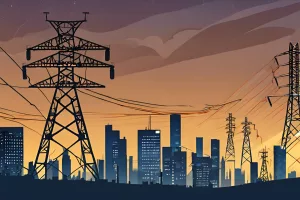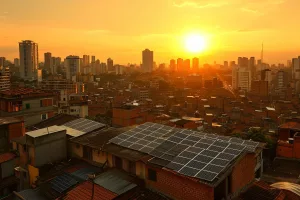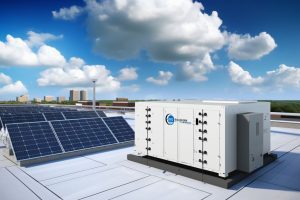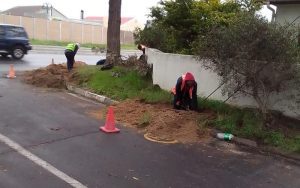Eskom, the national power provider in South Africa, achieved a remarkable feat by going 100 consecutive days without load shedding. This achievement is a result of the organization’s tenacity and tactical planning, and has generated an estimated R6.2 billion decrease in Open Cycle Gas Turbines diesel expenditure. Eskom’s immediate focus is to recover more power from their generation coal fleet and Koeberg Unit 2 before the end of the year, and they attribute their success to the relentless efforts of their devoted and proficient employees.
Eskom, South Africa’s national power corporation, has achieved a significant improvement in energy availability, with an Energy Availability Factor (EAF) of 70.78%, ending nearly three years of struggle with power supply. This progress is credited to the initiatives implemented by the current Eskom board, including solidifying the management team, implementing performancebased incentive bonuses, and identifying critical power stations requiring immediate attention. Eskom’s dependence on Open Cycle Gas Turbines (OCGTs) has also lessened due to the improved performance of its coal fleet, resulting in lower diesel usage and greater efficiency. The contribution of businesses and renewable energy sources also signals a hopeful outlook for the future of South Africa’s energy sector.
The City of Cape Town plans to invest over R4bn in upgrading and maintaining its electricity grid over the next three years, moving towards a decentralized energy future and allowing for smallscale, independent power producers. This investment aims to terminate loadshedding and stimulate economic growth, with the Building for Jobs budget reinvesting revenue from electricity sales. Residents can provide suggestions via email, telephone, or through their Ward Councillor/Subcouncil offices to participate in shaping this future.
Eskom, South Africa’s national electricity supplier, has achieved a new record of three weeks of continuous and uninterrupted power supply, surpassing the previous record of 19 days. This achievement is attributed to tenacity, timely upkeep, and upgraded management practices. However, the Minister warns against complacency and emphasizes the need for persistent investment, rigorous management, and steadfast commitment to maintain this success. Eskom’s recent achievement showcases its capacity to rise above the odds, mapping out a new, positive course in South Africa’s power narrative.
The Western Cape province in South Africa is leading a pioneering energy revolution to eliminate load shedding, investing R7 billion over the next three years. This commitment includes a significant contribution from the City of Cape Town and other municipalities, as well as various solar and wind projects. The province is encouraging private households and businesses to install embedded generation, and their progress towards energy independence could serve as a model for others to emulate. Despite challenges, their resilience, innovation and collaboration foster hope for a selfsufficient, energyresilient future.
Cape Town’s Power Heroes Initiative is a program that aims to reduce electricity demand and neutralize a complete stage of loadshedding. Participants are provided with a smart device that allows them to remotely control nonessential power loads, such as home appliances. The initiative is part of a broader strategy to shield consumers from loadshedding and create a more diverse and robust power supply landscape, with the potential to save energy and transform the world.
Cape Town is taking a pragmatic and innovative approach to tackling energy security by incorporating independent power sources into its grid system. The city’s goal is to acquire power from existing generators and build resilience against loadshedding, with a capacity target of up to 300 MW of dispatchable or reserve power and an additional 200 MW of selfdispatchable power. Led by Mayoral Committee Member for Energy, Councillor Beverley van Reenen, Cape Town is deploying a combination of various energy sources and strategies, including demand management initiatives and diversifying power supply sources to mold the future of energy provision and utilization.
Load shedding, or the intentional power outages due to an imbalance between electricity supply and demand, is not just a local problem but a global energy conundrum. The issue affects countries like South Africa and Cyprus, with the latter benefiting from the European Union’s robust framework to ensure energy security. The challenge of load shedding highlights the importance of diversifying energy sources and fortifying infrastructure to avoid power crises and achieve a sustainable future.
This article explores international perspectives on load shedding, from Cyprus’ shift towards renewable energy to the European Union’s interconnectivity initiatives. South Africa’s struggles with load shedding are also discussed, highlighting the need for strategies to address energy crises. Ultimately, international collaboration and sustainable solutions are crucial for a resilient energy future amidst geopolitical complexities.
South Africans have received temporary relief from Eskom’s load shedding as the power utility has announced a suspension until Wednesday at 4 pm. The cause is credited to Eskom’s sufficient emergency generation reserves and lowerthananticipated evening peak demand. While some have expressed gratitude for the respite, there is a need for continued efforts to address underlying issues in the country’s energy sector. Nonetheless, the improved performance of Eskom’s power generation fleet provides a glimpse of hope to the ongoing energy crisis in South Africa.
South African citizens can enjoy a break from load shedding as Eskom halts the power outages for the weekend due to stable generation capacity. After this point, Stage 2 load shedding will recommence from 4 pm until 5 am on Tuesday. Eskom has also shared an update on the status of Koeberg Unit 1, indicating the end of its outage and its synchronization with the grid expected by October 2023. The anticipated revival of Koeberg Unit 1 offers hope for enhanced energy availability in the future, and residents are encouraged to explore the city during the load shedding suspension.
Load shedding, a common occurrence in South Africa, has returned yet again. Eskom, the country’s primary electricity provider, has confirmed the situation will continue for the rest of the week. The cause is the delay in returning units to service, leading to a significant decrease in capacity and leading to renewed load shedding across the nation.
The Problem of LoadShedding Loadshedding has become a common problem in urban areas, affecting the lives of many citizens and their interaction with public services. The City has taken significant steps to ensure that its services remain accessible and uninterrupted, even during power outages.
Metropolitan areas experience a considerable upsurge in electricity service requests due to the effects of storms and recurrent loadshedding on infrastructure. The challenges faced by city teams attempting to restore power throughout urban centers are further magnified by theft and vandalism, which exacerbate the damage caused by weather conditions.
As a cold front sweeps through the region, there has been a surge in electricityrelated service requests. The residents are advised to prepare for the cold, damp, and blustery conditions that are expected to persist over the weekend. The inclement weather can further worsen power service issues, leading to a rise in demand for assistance.
The South African government has expressed deep regret and concern over the ongoing electricity crisis, which has resulted in load shedding and caused hardships for citizens. However, the administration remains committed to enhancing the country’s electricity generation capacity to alleviate the severity of load shedding and its impact on people’s lives.
















